 GENERAL AUDIENCE TODAY:
GENERAL AUDIENCE TODAY:
Pope reports on Malta trip
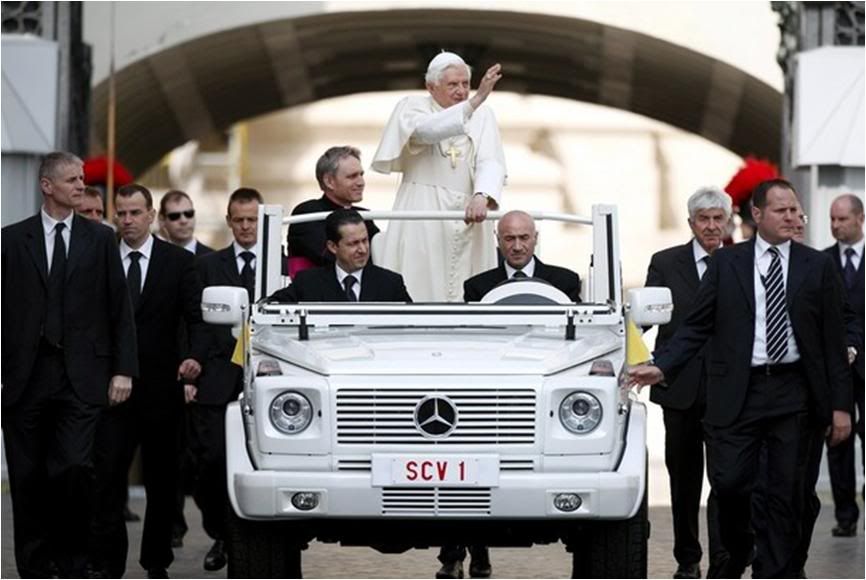
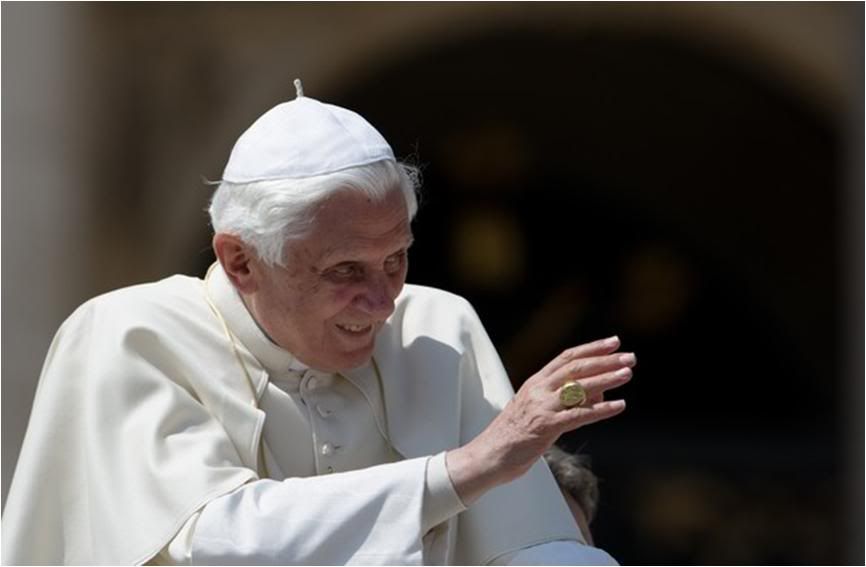
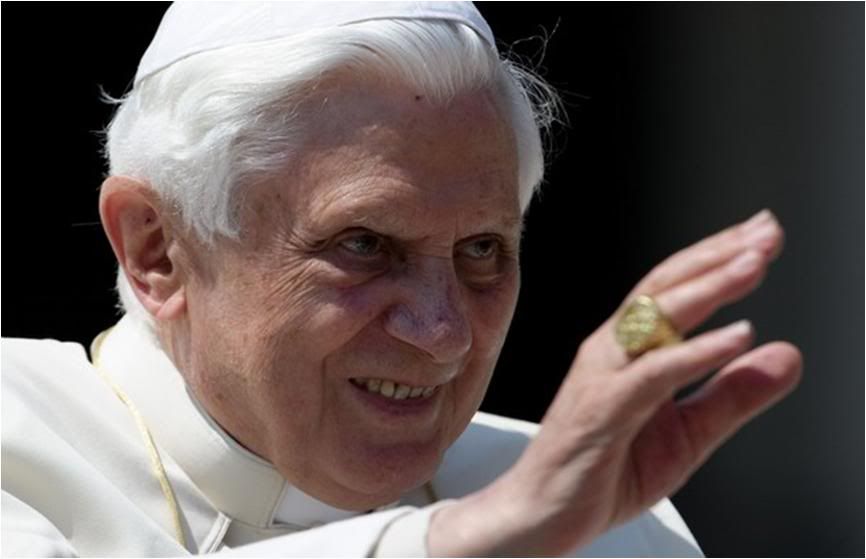
Before a crowd of at least 30,000 faithful, Pope Benedict XVI used teh General Audience at St. Peter's Square today to report on his apostolic visit to Malta this weekend. Here is what he said in English:
This past weekend I had the joy of visiting Malta for the nineteen hundred and fiftieth anniversary of Saint Paul’s shipwreck and his three-month sojourn there. I am deeply grateful to the civil and church authorities, and to all who received me so warmly.
At the Grotto of Saint Paul I thanked God for the abundant fruits of faith, holiness and missionary zeal which the preaching of the Apostle has brought forth on those islands. The Christian vision, so deeply rooted in Maltese life and culture, continues to provide inspiration for meeting the great social and moral challenges of the present time.
The vitality of the faith in Malta was evident in the joyful celebration of Mass before the Church of Saint Publius. As a natural crossroads, Malta has never been isolated or self-enclosed, nor has the Maltese cross, which I saw waving everywhere, ever lost its authentic meaning as a sign of love and reconciliation.
The challenge of passing on the perennial wisdom and truth of the Gospel belongs in a particular way to the younger generation. At the port of Valletta, I challenged Malta’s young people to look to Saint Paul’s spiritual journey as a model for their own, to let their lives be changed by an encounter with the Risen Christ, and to trust that God’s loving plan is more powerful than any storm or shipwreck along the way.
However, the instant headlines that made their way around the world at the speed of a mouse click were two sentences, translated as follows:
After Mass, I met with some persons who were victims of acuses committed by representatives of the clergy. I shared their account of their suffering, and with much emotion, I prayed with them, assuring them of action by the Church.
The headlines were 'Pope promises Church action against abuse" - as if this was the first time he has said that, or as though no Church action had ever been taken before!
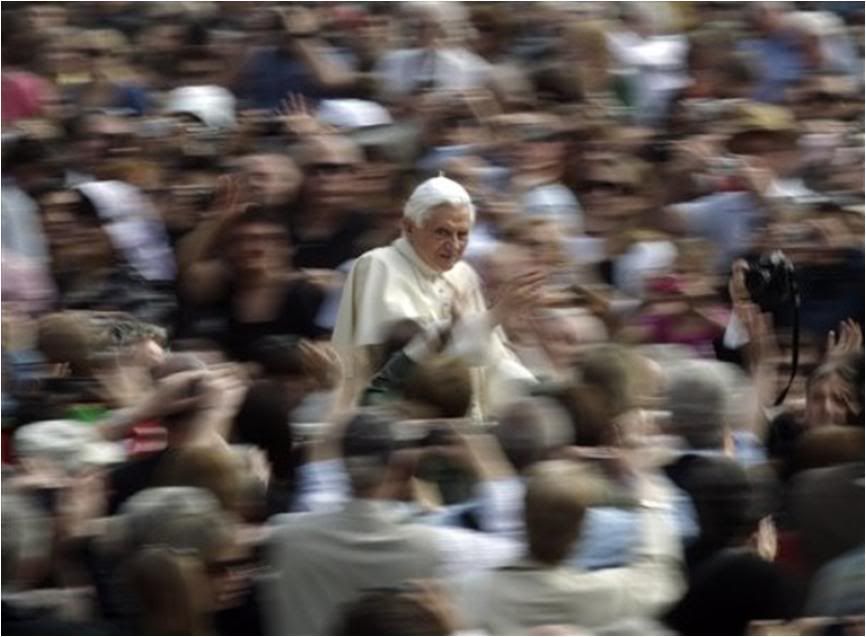
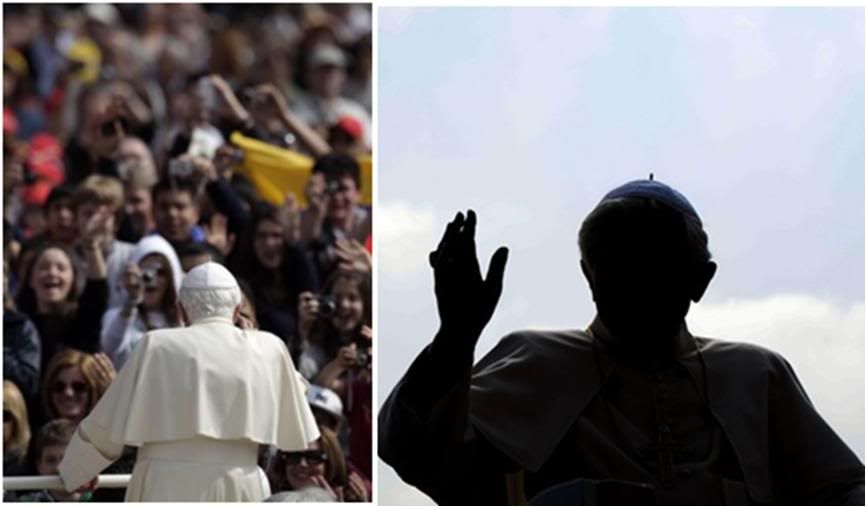
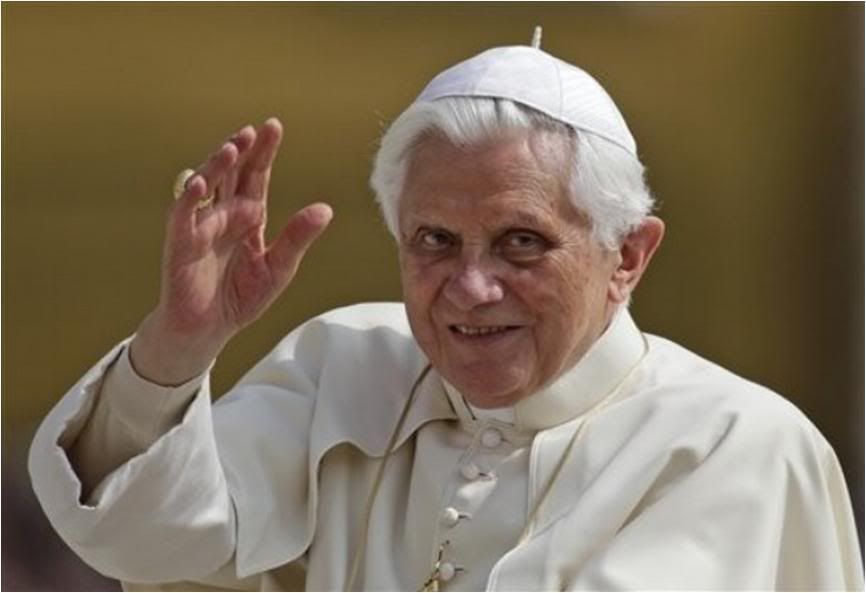
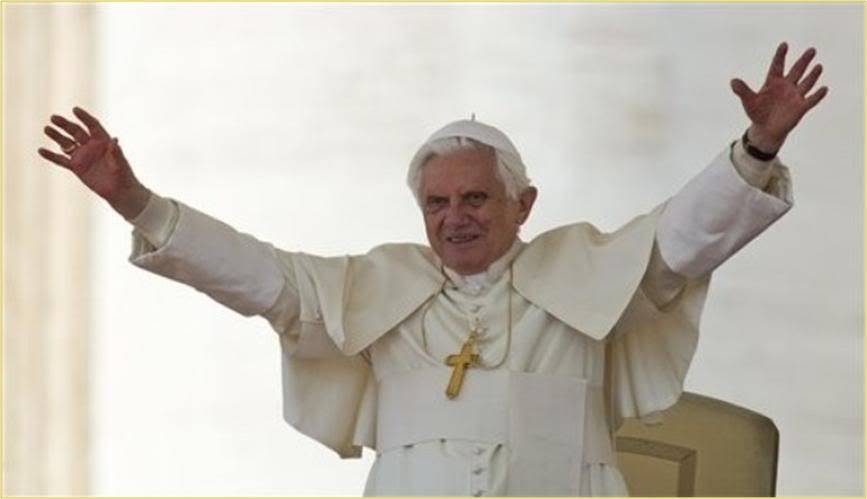
 Here is a translation of the Holy Father's catechesis:
Here is a translation of the Holy Father's catechesis:
Dear brothers and sisters!
As you know, last Saturday and Sunday, I made an apostolic visit to Malta, which I would like to dwell on briefly today.
The occasion for my pastoral visit was the 1950th anniversary of the shipwreck of the Apostle Paul along the coast of the Maltese archipelago and of his sojourn in those islands for three months. It was an event thought to have taken place around 60 A.D. and which is narrated with great detail in the Acts of the Apostles (chapters 27-28).
As St. Paul did, I too experienced the warm welcome of the Maltese - truly extraordinary - and for this, I express anew my most sincere anf heartfelt gratitude to the President of the Republic, to the Government and other state authorities, and I fraternally thank the Bishops of the land, and all those who worked together to prepare the festive encounter between the Successor of Peter and the Maltese people.
For almost 2000 years, the story of this people has been inseparable from the Catholic faith which characterizes their culture and their traditions. They say that in Malta, there are at least 365 churches, "one for every day of the year", which is a visible sign of its profound faith.
Everything began with that shipwreck. After drifitng for 14 days, driven by winds, the ship which was bringing the Apostle Paul and many others to Rome ran aground just off the isle of Malta.
That is why, after meeting with the President of the Republic in the capital city, La Valletta - in the beautiful settting of a joyful greeting from so many schoolchildren - I proceeded right away in pilgrimage to the so-called Grotto of St. Paul in Rabat for a moment of intense prayer. There, I was also able to greet a large group of Maltese missionaries.
To think of that tiny archipelago in the middle of the Mediterranean and how the seed of the Gospel reached it, inspires a sense of great wonder for the mysterious designs of Divine Providence. One spontaneously thanks the Lord and also St. Paul, who in the midst of that violent tempest, kept his trust and hope, transmitting these to his fellow travellers.
From that shipwreck, or better, after Paul's sojourn in Malta, a fervent and solid Christian community was born which, after 2000 years, is still faithful to the Gospel and is striving to conjoin it with the complex questions of contemporary times.
Of course, this is not always easy, nor taken for granted, but the Maltese people see in the Christian view of life the answers to new challenges.
A sign of this, for instance, is that they have kept firm a profound respect for unborn life and for the sanctity of matrimony by choosing not to include abortion and divorce in the nation's juridical order.
Thus, my trip had the purpose of confirming in the faith the Church in Malta, a very lively reality, well manned and present over all the territory of Malta and Gozo.
This community gathered in Floriana, on Granaries Square, before the Church of San Publius, where I celebrated Holy Mass which was attended with great fervor.
For me it was cause for great joy, and also of comfort, to feel the particular warmth of that people who convey the sense of a great family held together by a common faith and the Christian view of life.
After the Eucharistic celebration, I met with some persons who had been victims of abuse by representatives of the clergy. I shared with them their suffering, and with great emotion, I prayed with them, assuring them of action by the Church.
Though Malta gives the sense of a great family, one must not think that because of its geographical conformation, it is a a society that is 'isolated' from the world. It is not, and one can see it, for instance, from the contacts that Malta has with various nations, and that one can find Maltese missionaries in many countries.
Indeed, the families and parishes of Malta have educated their young people so well in the sense of God and the Church that many of them have responded generously to the call of Jesus to become priests. Among them, many have embraced the missionary commitment ad gentes in distant lands, inheriting the apostolic spirit that impelled St. Paul to bring the Gospel wherever it had not yet arrived.
This is an aspect that I gladly reaffirmed, namely, that "faith is reinforced when it is offered to others" (Enc. Redemptoris missio, 2). On the rootstock of this faith, Malta developed,- and now, it is open to various economic, social and cultural realities to which it brings its own precious contribution.
It is clear that Malta has had to defend itself often in the course of centuries, and one can see this in its fortifications. The strategic position of the tiny archipelago onviously attracted the attention of various political adn military powers.
Nonetheless, the deepest vocation of Malta is Christian, namely, the universal calling to peace. The famous Cross of Malta that everyone associates with it, has flown as a standard in so many conflicts and contests.
But thank God, it has never lost its authentic and perennial significance: It is the sign of love and reconciliation, and this is the true vocation of peoples who welcome and embrace the Christian message.
A natural crossroads, Malta is at the center of immigration routes: men and women, as in the time of St. Paul, have landed in Malta, often driven by arduous living conditions, violence and persecution.
Of course, this brings with it complex problems on the humanitarian, political and juridical levels - problems that do not have easy solutions but ones that have to be worked on with perseverance and tenacity, arranging for interventions on the international level. This should be done in all nations that have Christian values at the root of their constitutions and their cultures.
The challenge of conjugating the complexities of today's world with the perennial validity of the Gospel is fascinating for everyone, but especially for the young. Indeed, the new generations are strongly aware of this, and that is why, despite the brevity of my visit, I did not want to miss having an encounter with the youth of Malta.
It was a moment of profound and intense dialog, made even more beautiful by the place where it took place - the port of Valletta - and by the enthusiasm of the young people.
I could not fail to recall to them the youthful experience of St. Paul: an exraordinary and unique experience, and yet able to speak to the new generations in every era, because of that radical transformation that followed his encounter with the Risen Christ.
So I looked at the young people of Malta as potential heirs of St. Paul's spiritual adventure, called like him to discover the beauty of God's love, given to us in Jesus Christ: to embrace the mystery of his Cross; to be victors in trials and tribulations; not to fear the 'tempests' of life nor shipwrecks, because God's plan of love is greater than tempests and shipwrecks.
Dear friends, this, in sum, was the message that I brought to Malta. But as I indicated, I received so much myself from that Church, from that people blessed by God who have known how to work validly with his grace.
Through the intercession of the Apostle Paul, of St. Giorgio Preca, priest and first Maltese saint, and of the Virgin Mary, whom the people of Malta and Gozo venerate with such devotion, may they always progress in peace and prosperity.
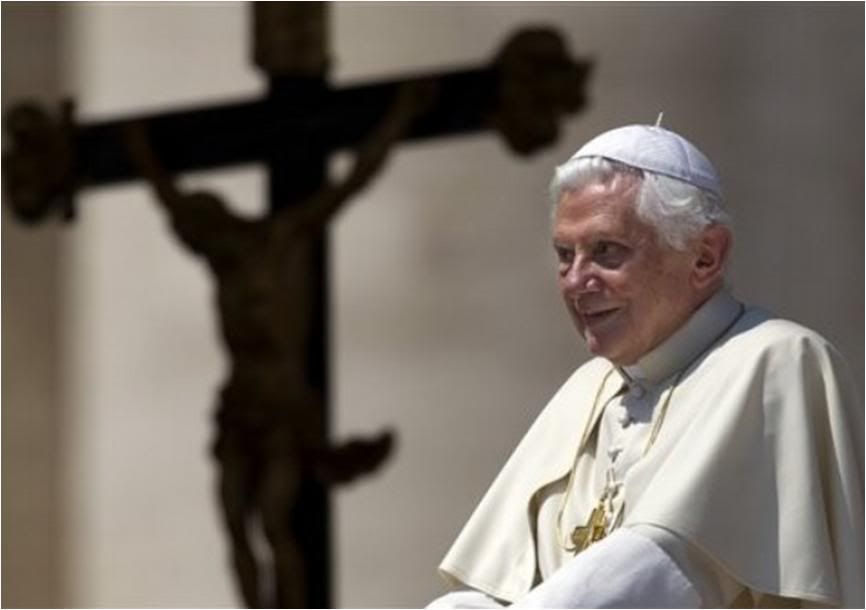
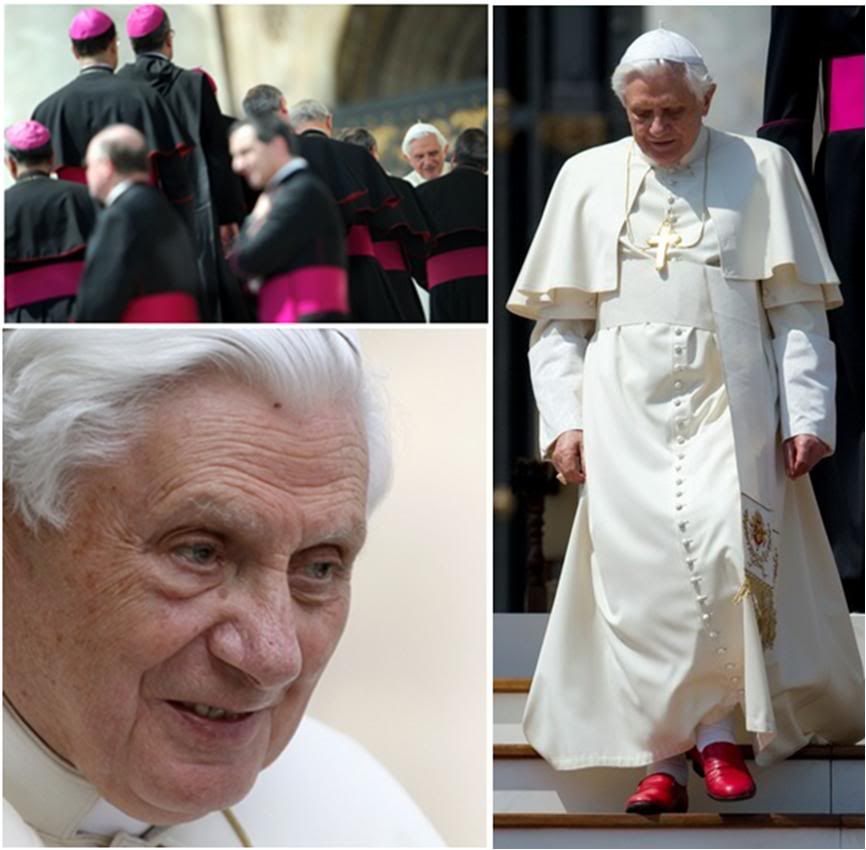
Among the groups present in St. Peter's Square today were 400 priests from the Diocese of Rome who have just returned from a pilgrimage to the shrine of St. Jean Vianney in Ars, France, on the occasion of the Year for Priests. They came wtih Cardinal Agostino Valli, the Holy Father's Vicar for Rome, to express their solidarity with the Pope.
Also present were 1,000 schoolchildren from Rome's Istituto Nazareth who came to express their support for the Pope. Cardinal Vallini later presented to the Holy Father a letter of support signed by thousands of university students in Rome.
Thanks to Lella and her blog
 for this GA sidebar and the picture she picked out of the OR catalog:
Pope blesses Marian image
for this GA sidebar and the picture she picked out of the OR catalog:
Pope blesses Marian image
from Nagasaki

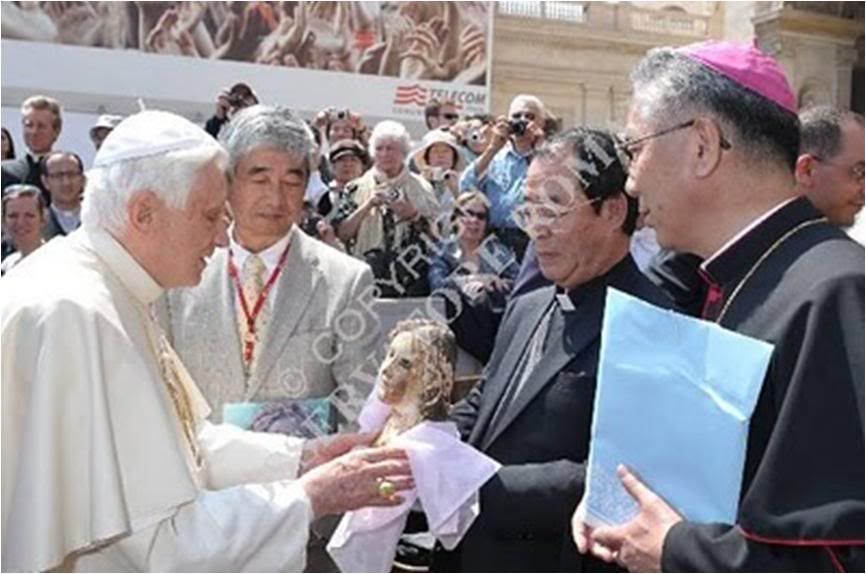
VATICAN CITY, April 21 (Translated from AGI) - At the end of the General Audience today in St. Peter's Square, Pope Benedict XVI blessed a statue of the Virgin Mary which survived the atomic bomb of August 9, 1945, and has been venerated ever since by Japanese Catholics who consider the image a symbol of peace.
The Archbishop of Nagasaki, Mons. Mitsuaki Takami, told the Pope that the image of Our Lady of Nagasaki will be taken next to Guernica, in Spain, where a statue of the Virgin also survived the infamous bombardment of the small town during the Spanish Civil War.
[The name Guernica has been immortalized by Pablo Picasso's painting tdepicting the carnage of that bombing.]
Both Marian images will then be brought to United Nations hedquarters in New York with a message for peace and against nuclear arms proliferation.
And here are the Vatican Radio online slideshow images of the Audience:
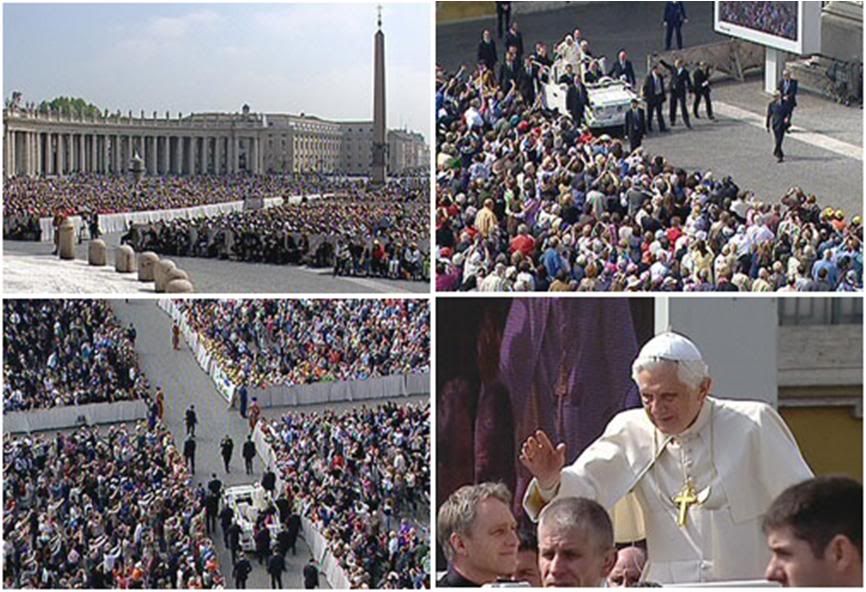
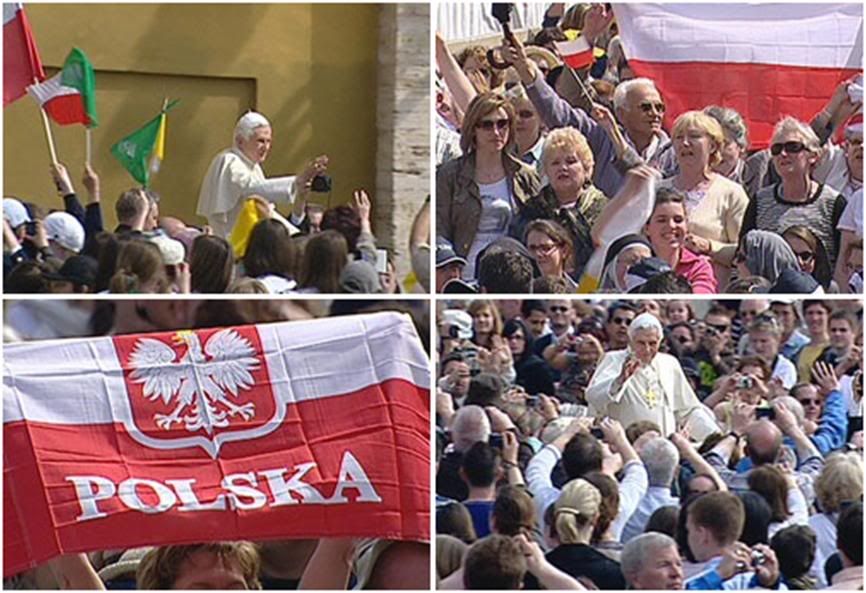 Priests rally around the Pope
Priests rally around the Pope
By Carmen Elena Villa

VATICAN CITY, APRIL 21, 2010 (Zenit.org).- Today's general audience concluded with the tune of "Happy Birthday."
Nearly 400 priests from the Diocese of Rome, accompanied by Benedict XVI's vicar-general for the diocese, Cardinal Agostino Vallini, and his auxiliary bishops, participated in the audience to thank the Pope for his five years in the See of Peter, and to congratulate him for his 83rd birthday.
His birthday was last Friday; the anniversary of his election was Monday.
The group of Roman priests was joined by priest-pilgrims from around the world.
"I thank you for your presence," the Pope told the priests at the end of the audience, "which is a sign of affection and spiritual closeness."
He added, "I take this opportunity to express my esteem and my gratitude to you and to the priests around the world who are dedicated to serving the people of God with apostolic zeal, giving witness of the charity of Christ."
At the end of the audience, ZENIT spoke with some of the priests.
Father José Herrera came with a group of priests from the United States, in Rome for a retreat: "We wanted to come to support our Holy Father, given that he is getting a lot of negative attention from all over the place. We want to support him with our prayer and our presence, as our shepherd."
A group of about 30 priests from the U.S. military service chaplaincy also participated in the audience. Among them was Father Steven from Philadelphia.
“We had the opportunity now to come to the Pope’s audience and it was a great joy for us. Any time, when we come to Rome, we come here together to the audience to see the Holy Father," he told ZENIT. “Benedict is a very strong leader in a very difficult time for the Church."
The priest also assured that during this Year for Priests, he has felt the prayerful support of the Catholic faithful.
Chilean Father José Luis Correa, one of the organizers of the June closing events for the Year for Priests, said that he was touched by the Holy Father's comparison of St. Paul's shipwreck in Malta with the current situation of the universal Church.
"I think," Father Correa said, "that we are in a time of tempests and storms, but if we know how to cling tight to Jesus Christ in love and fidelity -- like the Pope is doing -- then we will weather the storm."
The priest added that the Year for Priests is an opportunity for interior renewal: "Our fidelity is dynamic, not static," he said. "It has to be renewed every day. It's like love between spouses. We priests have also entered into a spouse-like relationship with Christ and with the Church."
Father Gerardo Cárcar, pastor at the Church of Sts. Francis and Catherine, patrons of Italy, reflected that this Pope was handed a task that was anything but easy. He noted that he had a concrete challenge from the very beginning: "to succeed John Paul II with his very long pontificate and his exceptional charisma."
Father Cárcar characterized the current Pope as "a man of truth, open, [a man of] ecumenical and inter-religious dialogue."
His pontificate has been "a blessing for the Church," the priest told ZENIT.
German Father Georg Elge, director of the International Center of the Schonstatt movement in Rome, said this Pope, through his teachings "helps one to see how faith and reason can go hand in hand and dialogue."
For his part, Benedict XVI made a concrete exhortation to the priests present: that following the example of St. John Vianney, they would be "patient pastors, looking out for the good of souls."
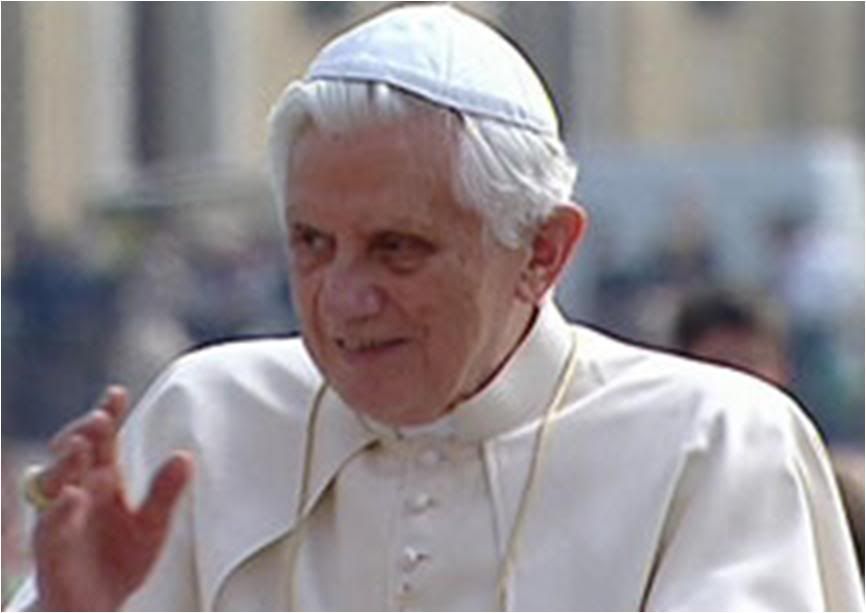
[Modificato da TERESA BENEDETTA 23/04/2010 01:44]